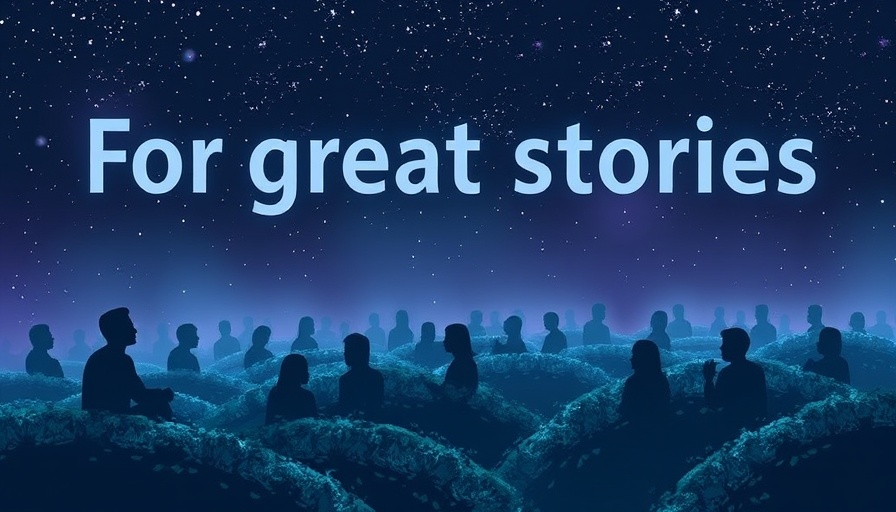
The Rise of AI in Creative Fields: A Double-Edged Sword
As artificial intelligence (AI) technology advances rapidly, its growing involvement in creative industries sparks an intense debate about its implications for writers and artists. Recently, famed author Jeanette Winterson celebrated the potential of AI-generated stories, elevating the conversation about the role of technology in literature. Yet, not everyone agrees with her views; critics argue that too much reliance on AI diminishes the human touch essential for storytelling.
This dichotomy sets the stage for a deeper inquiry into how AI reshapes creative fields. While AI can mimic human writing styles and even produce coherent narratives, does it possess the emotional depth or lived experience necessary to resonate with readers? The ongoing discussions highlight both the excitement surrounding AI capabilities and a rising apprehension that the unique perspectives of human authors may be overshadowed.
Understanding the Critiques: Is AI Undermining Human Creativity?
Critics such as Henry Futcher challenge the assertion that AI-generated content is equivalent to human stories. Futcher points out that while machines may generate text, each piece of AI writing represents a lost opportunity for human authorship. As AI becomes a prominent tool in storytelling, questions arise about opportunities for upcoming writers and the originality of creative outputs — will these pieces be recognized, or will they fade in the sea of AI-generated content?
Moreover, critics worry about the potential displacement of creative jobs. If AI continues to dominate writing, editing, and artistic roles, there’s a genuine concern about job security for human creators. Futcher's poignant challenge emphasizes that as AI gains visibility in mainstream outlets like The Guardian, emerging voices may lack the same platforms to shine. Are we witnessing a transformation in creativity, or a potential devaluation of human artistry?
Appreciating AI’s Role: Can it Enhance Creative Expression?
On the other side of the debate, some scholars, including Graham Mort, suggest that AI could illuminate the creative process. Mort argues that just like human authors draw from their experiences, machines can also generate narratives that prompt introspection and exploration of what it means to be human. In this way, AI-generated storytelling can expand the scope of literature, providing new avenues for exploration and engagement.
Furthermore, as AI continues to evolve, it may serve as a supportive tool for writers, especially for those who struggle with creative blocks. For instance, employing AI as an assistant could lead to innovative collaborations that enhance human creativity rather than replace it entirely. In this emerging landscape, it is essential to view AI not solely as a competitor for creative outputs but as a partner in the narrative process.
Looking Ahead: The Future of AI and Human Collaboration
The debate surrounding AI’s role in creative industries is likely to persist as technology advances. As AI tools become increasingly sophisticated, both creators and consumers must consider the implications of this shift. Will readers continue to value human-generated stories more than those produced by machines, or will a hybrid future where both can coexist redefine literary landscapes?
Additionally, ethical questions are bound to arise. Content creators may feel pressure to conform to AI-generated narratives to compete in the evolving marketplace. Writers must navigate this new terrain and define their identity amidst ongoing automation. Exploring the balance between human creativity and AI assistance could lead to vibrant storytelling possibilities that honor both.
Decisions for Readers and Writers: Finding Balance in AI Frenzy
For writers and readers alike, using AI tools should come with discernment. Engaging with AI as a resource can enhance creativity, but it should not overshadow the unique, emotional truths only human authors can convey. As enthusiasts of all things AI, it is vital to merge both worlds - fostering innovative creations with the insights enriched by our shared human experiences.
In conclusion, as we navigate this new chapter in storytelling, let’s remain conscious of the irreplaceable human elements that define our narratives. Readers must advocate for original human work and offer aspiring writers a platform to shine. The future of storytelling should reflect both innovative technology and the deeply personal experiences that resonate with what it means to be human.
 Add Row
Add Row  Add
Add 




 Add Row
Add Row  Add
Add 

Write A Comment